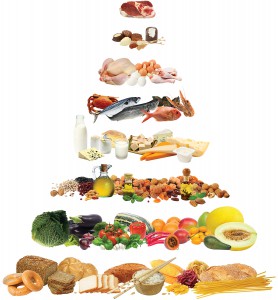
Here are some facts about the Mediterranean Diet so you can decide if it may work for you (photo credit: BigStockPhoto.com)
There are many different diets that seem to be all the rage – going gluten-free, eating paleo-friendly, following the Mediterranean meal plan – it can be hard to know what is what and what you should eat. This is why we try to delve into the details of some of these dietary programs to help you separate the myth from the fact and to determine if there is any truth to the health benefits these programs hype.
What is the Mediterranean Diet?
The foundation of the Mediterranean Diet is choosing to eat the same foods eaten by those native to the Mediterranean region. The benefits promised by following this plan are better health and a reduced risk of heart disease, cancer, diabetes, Parkinson’s, and Alzheimer’s disease. The Mediterranean Diet is based on the results of research conducted after World War II that seemed to indicate that the lifestyle of those in this region was the healthiest in terms of cardiovascular disease rates and longevity.
Now, if you are like many Americans, your first thought when reading that is likely surprise. We generally conjure up images of pasta from Italy or moussaka from Greece when we think of Mediterranean food. So the idea that eating this way would be healthier for you might cause immediate red flags because these are not generally the kinds of dishes you would associate with a “healthy” diet. However, although those dishes are eaten in Mediterranean cultures, their daily diet is somewhat different. In truth, the people of this region eat a diet that consists primarily of fruit, vegetables, seafood, hearty whole grains, nuts, beans, and olive oil which sounds a lot more in line with what is currently considered healthy.
What Do You Eat?
One of the differences between the Mediterranean Diet and some of the other popular food plans that are all the rage right now is that it incorporates factors beyond food. The research on which the diet is based found that the diet of this region was important in producing lower rates of cardiovascular disease and longer life spans but it wasn’t the only factor. Living an active lifestyle that included daily exercise was also an important factor as was sharing meals with other people and having an attitude of appreciation for the food being eaten.
All that being said, what you eat is the most important factor. To follow the Mediterranean Diet, start by focusing on fresh, unprocessed foods that fall into the categories listed above. Here are some of the other important tenets of the Mediterranean Diet plan:
- Eat a lot of vegetables
- Rather than having meat as the focus of your meal with vegetables and grains in support roles bump the meat down to a side dish and shine the spotlight on the veggies.
- Never skip breakfast
- Eat fish two times a week
- Get your fats from sources that provide good, heart healthy fats like olive oil, nuts, seeds, and vegetables like avocados
- Limit your intake of dairy
Does it Work?
Unlike many other eating programs, the Mediterranean Diet does have its foundation in scientific research which lends some credence to its claims. The key is to adopt the entirety of the lifestyle advocated by the program and not just to make a few swaps in what you are eating.
Related articles
- 2 Small Steps to a Healthier Diet (fillyourplate.org)
- 5 Tips for Starting Your New Year’s Diet Off Right (fillyourplate.org)
- How Small Steps in Our Diet Can Reap Real Rewards (fillyourplate.org)

